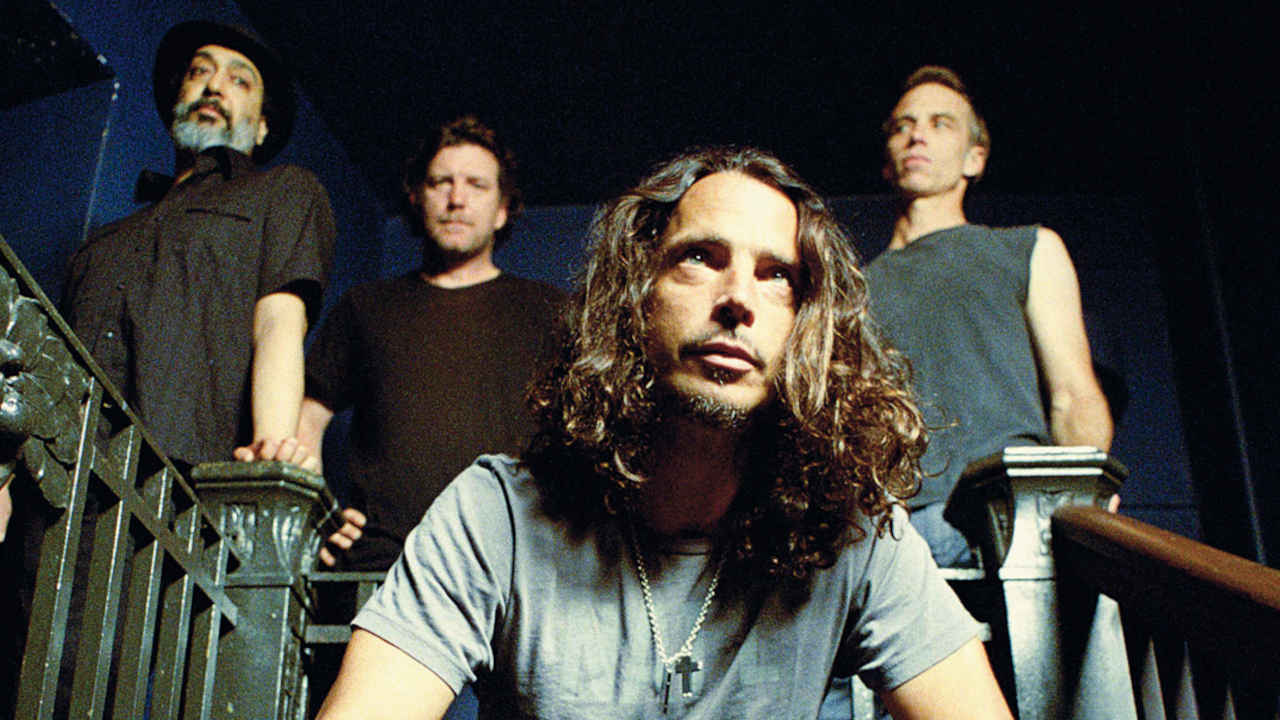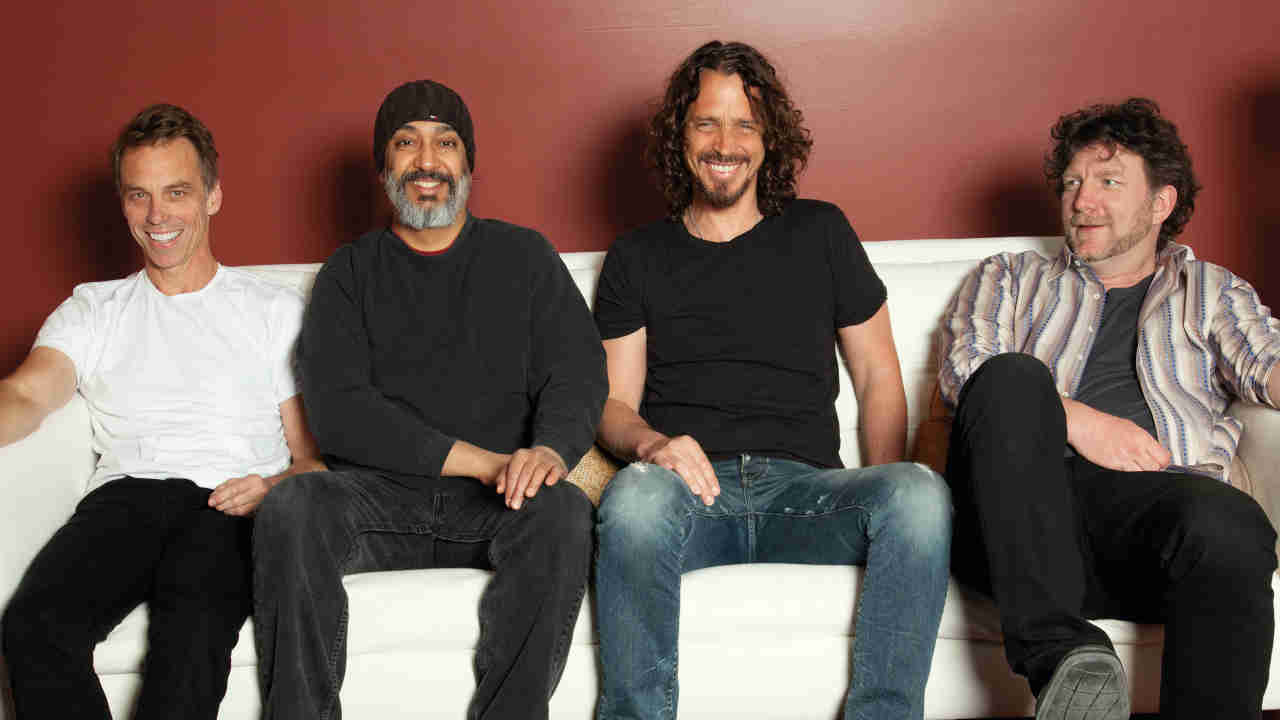
After splitting at the height of their success in 1997, grunge pioneers Soundgarden reunited in 2010, dropping comeback album King Animal two years later. In 2012, late frontman Chris Cornell and guitarist Kim Thayil discussed the sometimes difficult journey that brought them back together.

Just as you can look up at the stars in the night sky and know that most of them are long gone, so you can often turn on the radio and know much the same thing. You can hear the songs, but you’ll never see the band that recorded them in a million years. And such was the case with Soundgarden who played their final show in Hawaii in February 1997, before announcing their break-up in April of that year. The stars were still shining, but they were long gone. Sure, frontman Chris Cornell went on to a successful solo career and you could hear some of the songs on the airwaves, maybe Black Hole Sun and Fell On Black Days, but you’d never get to see Soundgarden.
Except you should never say never. Fifteen years may be an eon in music, light years between planets, but Soundgarden are back. What’s more, they have a new album called King Animal, and it’s very, very, well, Soundgarden, whatever that is. Rest assured, it’s the real deal, a reborn star, and not the pale imitation you’ll see when some other bands get back together.
“Like perhaps the record will be more commercially orientated and soft?” says guitarist Kim Thayil. “Like maybe it will be mediocre, and we’ll push out a formulaic Soundgarden song? But if you listen to all our albums it’s really difficult to nail a Soundgarden formula down. There’s certain characteristics and qualities of the way we play that will be present in our songs, and maybe incorporating noise and feedback into our music, but I think it would be easier to see something formulaic in a Ramones song or a Sex Pistols song.”
“For me personally,” says Chris Cornell, “there is a certain amount of confusion, like, how do I make that next Soundgarden song closer to the feel of what a Soundgarden song should be, you know? How can I make it one better next time? And 15 years kinda fixed some of that. There’s aspects of this new album where I was like, ‘Wow, I’ve always wanted to be able to do that!’ Whether it’s vocal tones, or guitar production, or mixing, which I always felt was a struggle, we’d pursue and conquer it, but it was a struggle, and I think a lot of those things have gone away. I’m not really sure why, whether it’s experience or having time off and being rejuvenated, but it’s there and I’m happy about that.”
Chris Cornell seems a lot happier about everything these days. It’s no secret that he went through some dark times, before and after Soundgarden broke up, those emotions inevitably seeping into the music, but he’s happily married with kids now, and says that the band are more patient with each other, going out of their way to make this work.
“I think we all probably felt, after the band was no more, that it was something really special to us all,” he says. “Then, while being grown-ups, having the opportunity to do it again, I feel like everybody’s trying really hard not to go down the different roads that we might go down when we’re getting impatient, or fed up, or self-conscious, all those things that make you behave badly in a band. I feel like everybody feels happy and lucky that we got the opportunity to do this again, and for real. It seems like it’s just as vital, and it’s almost like this is your last chance to get it right, but if you get it right then you get it right forever. And we can continue to do this if everybody has the right perspective.”

Ironically, though, many of Soundgarden’s biggest hits came from those darker places (hey, we’ve all fucking been there) and that’s what made those songs so universal. But while Kim insists that Soundgarden’s music sat down with you, put an arm around you, and told you that you weren’t alone, surely it’s difficult to write music like that if you’re, well, happy?
“It didn’t seem to affect Soundgarden songs or writing at all and I’m not really sure why,” says Chris. “It made the process more fun being in a better space mentally and not having the emotional ups and downs that I may have had before making Soundgarden records, but there’s definitely moody stuff that I didn’t have to invent. I mean, I didn’t have to pretend to be a dour, sad person. The access was easy, and it could be that that’s what the music is asking for and it’s sort of natural, I don’t know. Going from moment to moment feeling like I’m in somewhat of a better mood doesn’t mean that I’m not having lots of moments of inner panic and freaking out.”
But did you rely more on memory this time, like when people write about the memory of drugs, for instance?
“Well, I can rely on my lack of memory due to doing drugs!” laughs Chris, equipped with a far better sense of humour than you might imagine. “Everything’s brand new because I don’t remember any of it! But the idea, for example, of conjuring up memories of my darker periods because it’s a subject I suddenly wanted to write about… Just conjuring up the memories can be so uncomfortable, and I don’t want to think about that, but if some part of a song seems to ask for that then it’s not only there, readily, by memory, but it can also be kind of a hard thing to deal with.
“Seattle was that for me because I hadn’t lived there for eight years after Soundgarden broke up, so when we got back together I was also going back there. It was good to be in a room with Ben [Shepherd, bass] and Matt [Cameron, drums] and Kim, and having a great time, but there was also a post-Soundgarden period where I had a lot of shitty, dark experiences, and that was all there.
“I was kind of juggling those two things, being a guy now who’s sober and happily married, has children, and is essentially, artistically, in a really great place, but then there’s that really dark time that I never dealt with emotionally. I just kind of escaped from it with my skin and that was about it, but you have to deal with it at some point, even if it’s just to acknowledge that it happened, because if you don’t then what’s gonna stop you from being back there? You have to recognise all the signs.”
In some ways it must be strange getting back together after all this time. Was it more like old friends getting back together or was it like having to undress in front of an ex-girlfriend, like you’ve seen each other naked, but it seems weird now?
“In a rock band you always have that thing where you don’t want to get undressed in front of each other!” laughs Chris. “But you work through it and deal with it. I feel like, particularly if you start young and that’s the band that you put together to be your dream band, then you always feel a little bit judged. Maybe with all this time we all feel a bit less judged, but there’s always that feeling when you write a song and you go to play it for you band because you want them to like it, but if they don’t like it then you don’t wanna do it. Anybody who wants their band to do a song they wrote, that their band doesn’t like, has got to be kinda stupid. There’s that trepidation, and there was a little bit of that this time in the same way that it was always there, but it seemed to go away pretty quickly.”
“It’s probably a little bit of both,” says Kim. “It is a bunch of friends getting back together, but there is a little bit of venerability and risk in trying to share with each other, especially after a long period of time where you may have felt a bit jilted or burned. There’s an emotional unveiling that you allow to be shared with the other guys, and when you part, even if there isn’t overtly a breach of trust, you might feel that because the other person has part of you. You have to divulge that of yourself and make yourself accessible and vulnerable, but that was something we were willing to do. But on the other hand it’s a bunch of friends getting back together and that’s what makes it easy.”
Kim, in case you were wondering, didn’t simply vanish after Soundgarden. While Chris and Matt Cameron were more high-profile with a solo career and a gig in Pearl Jam respectively, both Kim and Ben Shepherd continued to play music on and off, Ben with his band Hater and with Mark Lanegan, Kim with everyone from Jello Biafra to Dave Grohl’s Probot. He thought about starting his own band but had no interest in pursuing record companies, lawyers, managers etc.
“I thought, what the hell, I’m just gonna play music, have fun, and drink some beer,” he grins. Every once in a while people would say, ‘Kim, when are you gonna do something?’ But I didn’t think that I was absent. Obviously if I was unhappy then I’d do something about it. Maybe on some level we didn’t appreciate it, but on another level perhaps there’s no reason to appreciate it. If you want to speak to people who are like you, then we did that. The fact that we were very big and played to a lot of people is something you might daydream about when you’re a teenager, but having achieved that without it being a goal, it was no longer a component of that daydream because it’s separate from the creative aspect. I wanted to be in a band that would appeal to younger musicians like Pink Floyd or the Ramones did to me, and we did that. That, to me, is the pinnacle of our success, not being a band that’s playing arenas or on the cover of Rolling Stone.”

Soundgarden did all that. And more. They’re a Marmite band, you either love them or hate them, but there’s no denying that they have become legends in rock music, perhaps more so now than when they were around the first time.
“It’s interesting,” ponders Chris. “I mean, we all probably got that separately a little bit, but it’s a different sort of ‘Ahh’ when they see you all walking out together on a stage. It was maybe a little bit scary at first because it’s hard to have that perspective of, will people think this is good? Will they view it differently? Or maybe we’re really different and I don’t really know it because I can’t see what we look like from the audience. But so far that side of it’s gone very well.”
“It was strange,” agrees Kim. “I learned about us being perceived as legends from other writers and musicians! So many of these guys have great regard and respect for us, and it was surprising because they don’t sound like us, their music might be doom or electronic music. And it’s fantastic! I’m seeing artists that I regard and respect and it turns out they feel the same way, and they’re not trying to imitate us. I love that; it’s encouraging and flattering and it makes me feel that we did something right. We were the band that played music and listened to music for musicians, and now we’ve passed on that torch.”
Just like the stars at night, some shine stronger than others. Some never get outshined.
Originally published in Metal Hammer issue 238, November 2012







